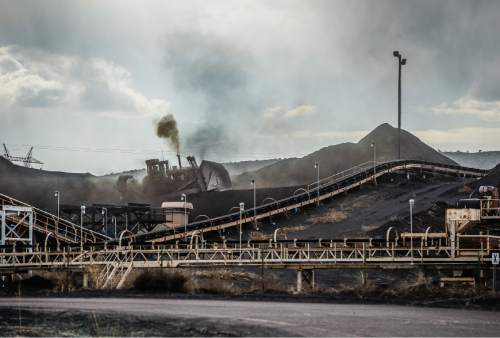This is an archived article that was published on sltrib.com in 2016, and information in the article may be outdated. It is provided only for personal research purposes and may not be reprinted.
Four rural Utah counties on Thursday withdrew their application to invest $53 million of public money in an Oakland, Calif., deep-water port — a project they've seen as a way to open up new export markets for Utah coal.
The move appears more technical than a sign they've given up on the project, although it may be a year before they submit a new application.
"We'll continue to look at our options and be prepared to move forward," Carbon County Commissioner Jae Potter said about plans by Carbon, Emery, Sevier and Sanpete counties.
He made the comments in an interview after those counties on Thursday officially pulled their original application for $53 million from Utah's Permanent Community Impact Board (CIB) to invest in the private Oakland Bulk and Oversized Terminal planned at the site of the long-defunct Oakland Army Base.
The withdrawal comes nearly two months after the Oakland City Council voted to ban coal handling and storage within its jurisdiction. Developer Phil Tagami had warned that such a ban could kill his project, part of a 130-acre development the city had approved three years ago.
Potter said last month that the City Council action was disappointing, but that Utah counties were continuing their efforts to secure funding while Tagami was attempting to work out whether the port and coal shipments from it were still feasible. A lawyer for the developer had previously hinted that the coal ban could prompt litigation.
On Thursday, Potter said the application withdrawal was prompted not by the coal ban but because of action by the Legislature earlier this year to approve a fund-swapping scheme that created a so-called "Throughput Infrastructure Fund." He said the counties would need to apply to that fund in the future for any money for a port or other projects, so the original application was essentially moot.
The legislation, which took effect July 1, authorizes swapping $53 million in state sales-tax revenue, earmarked for transportation, for an equal amount of mineral royalties from the CIB. It was aimed at removing questions raised by some environmental groups whether the royalties from mining on federal lands could legally be spent on an out-of-state project.
CIB money typically is used for local projects such as roads, water systems or parks to help reduce impacts on communities from mining, but the board created controversy last year by approving investing in the Oakland port to help local coal mining, which still is a major source of employment in the four rural counties involved.
Thursday's apparently procedural move prompted the Alliance for a Better Utah, an opponent of the port investment, to issue a news release praising the counties for pulling the plug on a "questionable and wasteful" project.
"We are grateful they have finally come to the realization that this coal port is not going to happen in the wake of the Oakland City Council vote," said the statement from Chase Thomas, policy and advocacy counsel for the nonprofit group. "We urge them to use this money as it has been intended — to invest in the communities affected by the extraction industry and to not attempt to use the money to fund another special-interest project."
Potter said the counties have not given up on the Oakland development, although he acknowledges the roadblock put in place by the Oakland City Council has complicated matters.
"For us to move forward, that is the No. 1 issue that must be resolved" by the developer, perhaps through legal challenges, before the counties would invest any money, Potter said.
"We don't have an immediate deadline for when we have to put in an application" to the new fund, Potter said. "We do have nine months' to a year's worth of work in due diligence, vetting the project, contracts that would have to be entered into. All those things have to be taken care of" before an application may be made.
He added that such vetting has always been planned before any state and county money would be spent to ensure its wise use.





